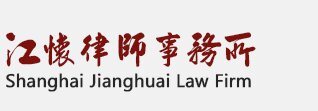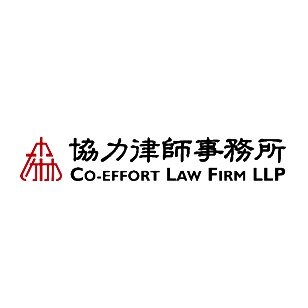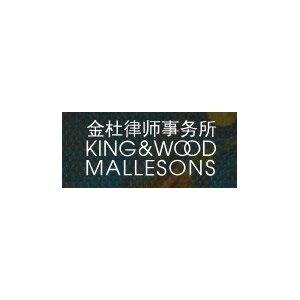Best Sanctions & Export Controls Lawyers in Beijing
Share your needs with us, get contacted by law firms.
Free. Takes 2 min.
List of the best lawyers in Beijing, China
About Sanctions & Export Controls Law in Beijing, China
Sanctions and export controls are important legal frameworks used by the Chinese government to regulate, restrict, or prohibit certain economic activities. This includes the export, reexport, transfer, or supply of goods, technology, and services for national security, foreign policy, and public interest reasons. In Beijing, the capital and a major international business hub, compliance with sanctions and export controls is a top priority for both domestic and foreign entities operating in the city. These laws are constantly evolving and have significant implications for companies involved in international trade, investment, and technology transfer.
Why You May Need a Lawyer
Legal advice is often necessary for businesses and individuals navigating the complex field of sanctions and export controls in Beijing. Common situations requiring legal help include:
- Determining whether certain goods, technologies, or services are subject to Chinese export controls or international sanctions
- Responding to investigations or enforcement actions by Chinese regulatory authorities
- Drafting contracts and compliance policies to avoid violations
- Managing cross-border transactions that may involve sanctioned countries, entities, or individuals
- Conducting due diligence on business partners or third parties
- Seeking licenses or approvals for controlled exports
- Handling voluntary disclosures of potential violations
- Advising on the impact of foreign sanctions and extraterritorial regulations on Chinese businesses
Local Laws Overview
Sanctions and export controls in Beijing are governed by a combination of national and local regulations. The primary legal instruments include:
- Export Control Law of the People's Republic of China: This comprehensive law, effective since December 2020, covers the export of goods, technologies, and services with military, dual-use, and commercial applications. It establishes a licensing regime, a list of controlled items, and strict penalties for violations.
- National Security Law and Cybersecurity Law: These laws provide additional controls and restrictions relating to critical technologies and data transfers with implications for export controls.
- Anti-Foreign Sanctions Law: This law allows China to impose countermeasures against foreign individuals or entities participating in measures that harm China's interests.
- Regulations on Unreliable Entity List: The Ministry of Commerce (MOFCOM) may place foreign entities on this list if they endanger Chinese interests, with potential export control consequences.
- Administrative Rules: Local agencies in Beijing, such as Beijing Customs and local branches of MOFCOM, issue implementation guidelines and supervise compliance at the regional level.
Frequently Asked Questions
What are export controls in Beijing, China?
Export controls regulate the movement of certain goods, technologies, and services from China to other countries or regions to safeguard national security, public safety, and strategic economic interests.
Who enforces sanctions and export controls in Beijing?
Enforcement is carried out by the Ministry of Commerce of the People’s Republic of China (MOFCOM), Beijing Customs, and other relevant government agencies.
Does Chinese export control law apply to foreign companies in Beijing?
Yes, foreign companies operating in Beijing must comply with Chinese export control laws, particularly if they export goods or technologies from China or engage in activities subject to Chinese regulations.
What are “controlled items” under Chinese law?
Controlled items include goods, services, technologies, software, and data with military, dual-use, or otherwise sensitive uses as specified in official control lists published by the government.
Are all exports from Beijing subject to export controls?
No, only items on China’s control lists or those involving destinations or entities subject to sanctions require special consideration, such as licenses or approvals.
What penalties exist for violating export controls in Beijing?
Penalties can include fines, suspension of business operations, license revocation, criminal charges, and being placed on the Unreliable Entity List.
How do I determine if my product needs an export license?
You should consult the latest control lists issued by MOFCOM or Beijing Customs, and seek legal advice if unsure, as classification can be complex.
What is the Unreliable Entity List?
It is a list maintained by the Chinese government of foreign companies or individuals considered a threat to China’s national interests, facing trade restrictions and other measures.
Can Chinese entities be targeted by foreign sanctions?
Yes, Chinese companies and individuals may be subject to foreign sanctions, and China may respond with its own countermeasures under the Anti-Foreign Sanctions Law.
Do I need to report potential violations?
Yes, it is a legal responsibility to report and rectify violations. Early reporting may reduce penalties, and legal counsel can guide the process.
Additional Resources
If you require further information or assistance, consider reaching out to the following resources:
- Ministry of Commerce of the People’s Republic of China (MOFCOM): The main authority on export controls, licensing, and sanctions
- Beijing Municipal Bureau of Commerce: Local implementation and guidance on compliance, registration, and local business support
- Beijing Customs District: Enforcement of export and import regulations, assistance with classification and clearance
- National Enterprise Credit Information Publicity System: Background checks on Chinese entities to assess sanction risk
- China Council for the Promotion of International Trade (CCPIT): Advice and mediation services for enterprises engaged in foreign trade
- Local chambers of commerce and industry associations: Practical compliance support and legal updates
Next Steps
If you believe your activities may be affected by sanctions or export controls in Beijing, it is important to act promptly. Here are some suggested steps:
- Identify whether your products, services, or transactions are subject to controls or sanctions based on the latest Chinese regulations
- Consult with a qualified legal professional in Beijing experienced in sanctions and export control matters
- Obtain official guidance from relevant governmental authorities if necessary
- Implement or update your internal compliance policies and training
- Prepare documentation for licenses or approvals well in advance of planned exports
- Monitor regulatory developments, especially during times of geopolitical change
A lawyer can support you in assessing risk, preparing applications or disclosures, and representing you in interactions with Beijing authorities. Taking early action helps protect your business and ensures you remain compliant with all applicable laws.
Lawzana helps you find the best lawyers and law firms in Beijing through a curated and pre-screened list of qualified legal professionals. Our platform offers rankings and detailed profiles of attorneys and law firms, allowing you to compare based on practice areas, including Sanctions & Export Controls, experience, and client feedback.
Each profile includes a description of the firm's areas of practice, client reviews, team members and partners, year of establishment, spoken languages, office locations, contact information, social media presence, and any published articles or resources. Most firms on our platform speak English and are experienced in both local and international legal matters.
Get a quote from top-rated law firms in Beijing, China — quickly, securely, and without unnecessary hassle.
Disclaimer:
The information provided on this page is for general informational purposes only and does not constitute legal advice. While we strive to ensure the accuracy and relevance of the content, legal information may change over time, and interpretations of the law can vary. You should always consult with a qualified legal professional for advice specific to your situation.
We disclaim all liability for actions taken or not taken based on the content of this page. If you believe any information is incorrect or outdated, please contact us, and we will review and update it where appropriate.
















